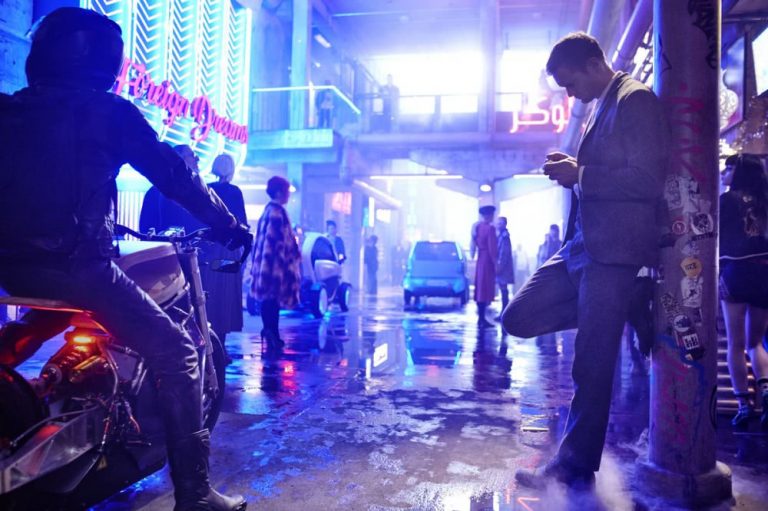Will we ever get over Blade Runner? Last year’s sequel Blade Runner 2049 says, ‘no’. Mute, the new film from director Duncan Jones, says, ‘give it a rest’. But I never want to get over Blade Runner. It’s a film that still manages to inspire our urge to prod what it means to be human through science fiction tales. So it’s understandable why Blade Runner is such a huge reference point for Mute. The lead character, a mute bartender named Leo (Alexander Skarsgard), could have his voice box fixed by robotics but chooses not to because of his Amish background. Leo’s humanity is a beacon in Mute. The story is centred on outsiders trying to re-build their lives in a foreign land with the backdrop of technological advances. One look at futuristic design of Berlin conjures the spirit of Ridley Scott’s iconic film, but it becomes a drain on the ability for science fiction to forge ahead with originality and purpose.
Set in Berlin, 40 years from now, Leo (Alexander Skarsgård), is looking for his missing girlfriend, Naadirah (Seyneb Saleh). Leo’s search leads to gangsters and two American surgeons (Paul Rudd and Justin Theroux) who seem to be the only constant in Naadirah’s disappearance.
Mute never forgets its own identity, and the plot is lethargic and directionless.
Mute struggles in the shadow of its influences, however endearing they may be, and fails to leverage the sum of its parts into something worthwhile. Naadirah’s blue hair recalls Eternal Sunshine of the Spotless Mind; the noir-style story evokes Chinatown; and the Amish element pings memories of Witness. The heart sinks at the number of times Jones references Moon as if to remind us of his capability, but we’ve already hit play on the goodwill of his previous work.
Mute never forges its own identity, and the plot is lethargic and directionless. Jones and co-writer Michael Robert Johnson take the plot of straightforward mystery and make it complicated to the point where there are so many diversions and laborious detours that it never feels like there’s a concrete story. Mute is like getting lost in a shopping centre, which is designed in nature to keep you inside to buy things you don’t need. The pressure to stack the backend of Mute with twists (a hallmark of Jones’ films Moon and Source Code) is apparent, but Jones’ seems to be working harder to make his film do the opposite, with an emphasis on exploring the lives of each character with long conversations and minimal action. The performances are scattered and Skarsgård never has the gravitas to anchor the film with his silent presence no matter how wide his eyes get. Theroux can never crawl out from beneath a shocking blonde wig, and Rudd stumbles in trying to make the transition from comedy to drama, getting stuck in a performance purgatory. There’s a heartfelt moment close to the finale but it overcompensates for the messy road to settling on an ending.
The future depicted in Mute is one that falls into line with a misogynistic point of view where women are objectified and murdered haphazardly. Not everything needs to pass certain standard of political correctness, but we’re at a point where these themes in science fiction are being explored with zero depth to make a significant point about the terrifying prospect of a future without equality of the sexes. If Mute is trying to make a statement about a male-dominated future – vital in the current political climate – it’s putting its pulpy aesthetic over substance.
Love Film & TV?
Get your daily dose of everything happening in music, film and TV in Australia and abroad.
Someone needs to stage an intervention with anyone dabbling in science fiction filmmaking. Blade Runner has become the ‘Stairway to Heaven’ of science fiction, and it’s no more apparent than in Mute.
Mute is available to stream on Netflix now.



































